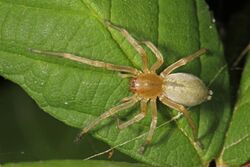Biology:Eutichuridae
From HandWiki
| Eutichuridae | |
|---|---|

| |
| Cheiracanthium sp., Pateros, Washington | |
| Scientific classification | |
| Domain: | Eukaryota |
| Kingdom: | Animalia |
| Phylum: | Arthropoda |
| Subphylum: | Chelicerata |
| Class: | Arachnida |
| Order: | Araneae |
| Infraorder: | Araneomorphae |
| Family: | Cheiracanthiidae Lehtinen, 1967[1] |
| Genera | |
|
See text. | |
| Diversity[2] | |
| c. 12 genera, 341 species | |
Eutichuridae is a family of araneomorph spiders.
The largest genus currently recognized as belonging to this family is Cheiracanthium, which has previously been placed in both the Clubionidae and the Miturgidae.
Taxonomy
The group was originally described as the subfamily Eutichurinae of the family Miturgidae by Pekka T. Lehtinen in 1967. The monophyly of the group is described as "reasonably uncontroversial", but it has been placed in either the Miturgidae or the Clubionidae. An analysis by Martín J. Ramírez in 2014 suggested that it was better considered as a separate family.[3]
Genera
(As of September 2015), the World Spider Catalog accepted the following genera:[1]
- Calamoneta Deeleman-Reinhold, 2001
- Calamopus Deeleman-Reinhold, 2001
- Cheiracanthium C. L. Koch, 1839
- Cheiramiona Lotz & Dippenaar-Schoeman, 1999
- Ericaella Bonaldo, 1994
- Eutichurus Simon, 1897
- Lessertina Lawrence, 1942
- Macerio Simon, 1897
- Radulphius Keyserling, 1891
- Strotarchus Simon, 1888
- Summacanthium Deeleman-Reinhold, 2001
- Tecution Benoit, 1977
See also
References
- ↑ 1.0 1.1 "Family Eutichuridae Lehtinen, 1967", World Spider Catalog (Natural History Museum Bern), http://www.wsc.nmbe.ch/genlist/113/Eutichuridae, retrieved 2015-09-29
- ↑ "Currently valid spider genera and species", World Spider Catalog (Natural History Museum Bern), archived from the original on November 3, 2015, https://web.archive.org/web/20151103044611/http://www.wsc.nmbe.ch/statistics/, retrieved 2015-10-04
- ↑ Ramírez, Martín J. (2014), The morphology and phylogeny of dionychan spiders (Araneae, Araneomorphae), Bulletin of the American Museum of Natural History, 390, http://hdl.handle.net/2246/6537, pp. 340–341
Wikidata ☰ Q17292584 entry

